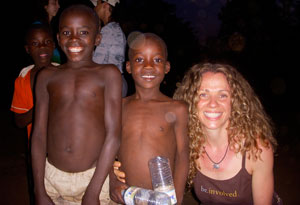A Culture in Trauma

Photo: Seane Corn
A yoga instructor and activist, Seane Corn has made it her mission to bring awareness to the HIV/AIDS crisis. She's sharing her story with us as she blogs from the Uganda Seva Challenge, a trip that will raise money to fund and build health education programs for children in Uganda.
I am in Kasana, a remote village in the bush about an hour away from Kampala, the city we've been staying in over the past few days. It is 6 a.m. and I am lying awake under a mosquito net listening to the sounds of Africa around me. In the distance I can hear a man chanting loudly to the rhythm of a drum. Ba-bup, ba-bup, like a heartbeat, as the man wails in a deep, earthy baritone, praying, I assume, in gratitude and devotion to God. Other than that, all is quiet except for the rising birds, calling back and forth to each other from the acacia and palm trees. Around me are the early morning smells of petrol and cooked plantains.It has been an amazing few days. The women who have come with us are all very diverse and interesting, and I'm looking forward to working with them and learning more about what inspired them to raise the money to get here. Our daily itinerary is full, and I expect that they will be both thrilled and challenged by this experience. Every morning, before we go to work, we will practice yoga and set our intentions. For this experience to be sustainable and deeply meaningful, it is essential that we spend time every day connecting to our bodies, breath, each other and God. By invoking the sacred, we can be reminded of what our purpose here is, beyond the obvious, which is the service work we'll do in the field. Through grace, we can remember that we are all connected, all one, and are here dignify the human experience, as it is, with love. Not with judgment or pity, which only perpetuates separation, but with understanding and empathy, qualities that unite. Yoga helps us to maintain this perspective in body, mind and spirit and gives us the tools we need to remain open. We can remember that is it our dharma, and privilege, to serve someone else's karma and move forward, willingly and lovingly, in that service.
Most evenings, we will gather together for "processing." This will give the women an opportunity to share their feelings, identify their fears, resistances and assumptions and cultivate skills they can call upon so as to stay absolutely conscious and present throughout these next two weeks. This will include sitting in a circle and checking in, participating in diversity rituals, journal writing, dyads and group sharing. It is necessary to include diversity practices because, for the second time in a row, all the women who have managed to raise the money and earn a spot on this trip are white. This includes Suzanne (my co-facilitator) and I. The only person of color is Nikki, who is our assistant on this trip and a strong voice for cultural awareness.
It is critical for all of us to explore perceptions, assumptions, prejudices, elitism, understand racial and class division and exclusion and be conscious of not projecting our experience, traditions or heritage onto the people of this or any culture. In service or outreach, there is often a desire to "fix" someone or a situation. To interfere without truly understanding the ways in which a culture operates, and respect how it defines and supports itself no matter the socio-economic-political circumstance, is arrogant and presumptuous. Which, by the way, I've certainly been guilty of being. Over the years, I have learned that when I come to serve, I need to understand, respect and work within the culture I'm serving and not impose my beliefs, customs, politics or comforts, unless invited to do so.
How the group is handling the journey
The opinions expressed by Oprah.com contributors are strictly their own.



